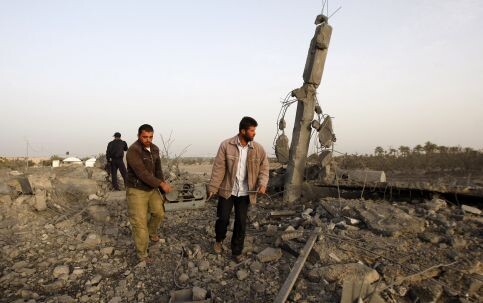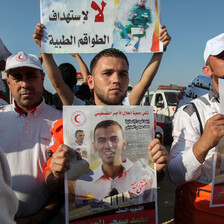22 December 2010

Palestinian men clean up the remnants of a destroyed dairy in Khan Younis after it was bombed by an Israeli air strike in the middle of the night. (Ismael Mohamad/UPI/Newscom)
A heap of ruins and dust is all that remains of a dairy that Israeli warplanes destroyed yesterday in the central Gaza Strip city of Khan Younis. The ruins of the dairy are adjacent to an amusement park in the Asdaa grounds which serves as a refuge to residents of the besieged Gaza Strip.
Before the bombing, the dairy had three production lines on 400 square meters. It produced milk, cheese and butter, providing income for forty Palestinian families in Gaza and distributing goods to various parts of the Gaza Strip.
At dawn, the dairy was hit by at least two jet-fired missiles, scattering machines and equipment several meters away and rendering the factory into a pile of rubble. The attack on the dairy comes amidst increased Israeli military activity across the Strip. Israeli warplanes also hit other targets on Tuesday, injuring four Palestinians, including a guardsman in Asdaa.
While inspecting the damage, Shadi al-Batsh, the dairy’s chief engineer, told The Electronic Intifada “This dairy was a dream and then became a reality but it finally turned to be a nightmare — not only for me but also for the forty workers who all have worked hard to make something under a crippling Israeli blockade.”
Standing amidst the rubble, al-Batsh described how the Asdaa dairy used to distribute its products across Gaza and the impact of the attack on the local economy, already straining under Israel’s 42-month-long siege.
“Our financial losses from this attack are estimated at about $300,000. Besides these direct financial losses, there is an indirect loss represented by the people who used to provide us with raw materials, plastic packs and those who used to carry the products in vans and distribute them to grocers in many parts of Gaza. We really wonder as to why such a place was targeted by the Israeli warplanes. It is a dairy and does not manufacture weapons or homemade rockets,” explained al-Batsh.
Al-Batsh added “This is the first time that the Asdaa facility was targeted. Today we had about fifteen buses of school children, on a field trip in which school children enjoy some time at the amusement park and this public garden. We are afraid that such trips would start to decrease after such a shelling.”
The Asd’a facility was built on the grounds of a former Israeli settlement. In addition to the dairy, it includes an amusement park, a fishery, a turkey pen and a public garden. The public garden features some wild animals, including monkeys, and a small train for children runs through the grounds; the train now passes by the ruins of the dairy. Since the facility was established, it has become an attraction for Gaza’s residents, who relish the opportunity to spend time outdoors in spite of Israel’s crippling siege.
Rusaila Hammad is a teacher from a nearby school who brought 120 children to the Asdaa gardens after the attack. “We learned earlier that the Asdaa facility was targeted. However, we in the school administration insisted that we should take the children on the scheduled school trip,” Hammad explained.
She added “Where should we go? To the sea or to Gaza’s closed borders? Do the Israelis think that by targeting such places they are doing the right thing? Such actions will only fuel hatred and these children have the right to enjoy their childhood as normally as children worldwide.”
Hammad explained that Asdaa is “one of the rare places for our children to release the stress they have to endure under the Israeli blockade and attacks on us.”
One of Hammad’s pupils, 14-year-old Marwa Zain, expressed her anger. “What do they want us to do? Every place in Gaza has become vulnerable to Israeli attacks. What do we children have to do with such violence? What do they want? We are determined to continue to come here; we have little choice because Gaza is a very small place and Israel is besieging it from all sides, including the coast.”
At another corner of Asdaa’s public garden, Fatma al-Hadidy asked a similar question. “If we stop visiting such a place out of fear of Israeli attacks, then where can we go? It is really a shame on them to attack such a place.”
Rami Almeghari is a journalist and university lecturer based in the Gaza Strip.





